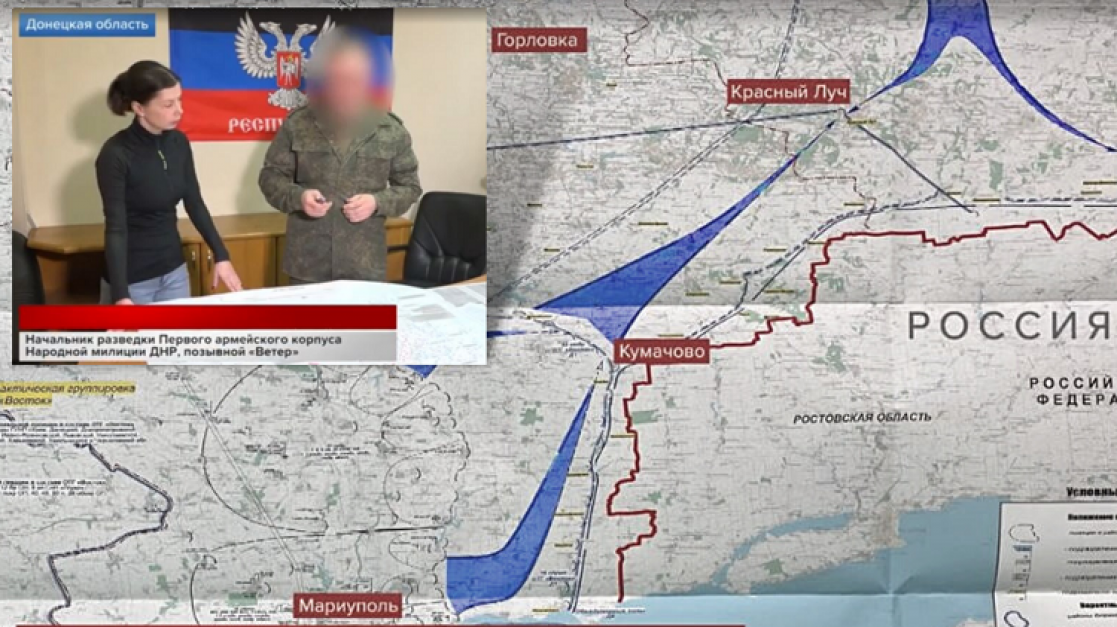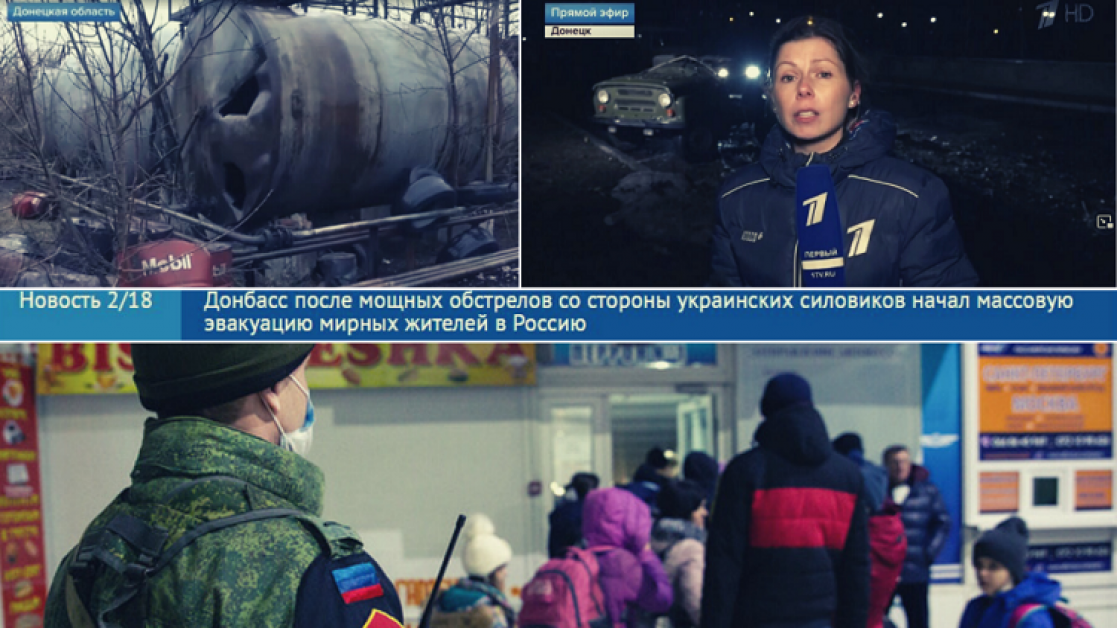Ukraine: Sanctions on Kremlin-backed outlets Russia Today and Sputnik
Original Press Release: https://ec.europa.eu/commission/presscorner/detail/en/IP_22_1490
Annex:
THE KREMLIN’S PLAYBOOK: FABRICATING PRETEXT TO INVADE UKRAINE - MORE MYTHS
(Source: https://euvsdisinfo.eu/)
Recently, we examined and debunked seven of the most prevalent and dangerous myths related to Ukraine.
Amid the continuous military escalation at Ukraine’s borders, Russian state-controlled media continue to cultivate disinformation narratives about imminent or even ongoing atrocities against the population in Donbas. All obviously, in an attempt to create a “casus belli”, a pretext for invasion and to keep the option of renewed, direct military aggression against Ukraine open.
False allegations accusing Kyiv of “atrocities” in Donbas have dotted the pro-Kremlin media throughout the years. Disinformation outlets, including the ones that were recently shown to have ties with the Russian intelligence services, have accused Ukraine of “ethnic cleansing” and “genocide” on many occasions in the past, see e.g. in 2014, 2015, 2016, 2017, 2018, 2019, 2020, 2021.
Now such falsehoods are recycled at the highest levels of the Kremlin.
Below follows an overview of some of the most prominent pro-Kremlin disinformation narratives that are or may be used as a pretext for further escalation of military aggression against Ukraine.

Alleged plans of Ukrainian military offensive broadcasted by Russian state-controlled TV. Pervyi Kanal, 17 February, 2022.
Myth: “Ukraine is planning to stage or conduct a terror attack in Donbas or Russia (with numerous casualties among the civilian population).”
Fact: This and similar allegations fall under the category of so-called false flag operation narratives where Ukraine is accused of either staging or conducting violent (“terrorist”) attacks. Recent examples include claims about plans to blow up dangerous industrial facilities, administrative buildings in Donetsk and references to “Polish mercenaries” – for more detailed analysis, see the DFR Lab.
One constant among such various claims is the notorious lack of any kind of credible evidence. No independent observers have been able to verify the claims. No trustworthy witnesses come forward. This includes the widely broadcasted car explosion in Donetsk on the 18 February 2022 where a reporter of Russian state-controlled TV was shown standing next to a mangled car with no credible forensic investigation in sight. A similar story of explosions of derelict containers for liquid substances is equally lacking documentation.
The Ukrainian government has categorically refuted similar disinformation claims.
The claims by pro-Kremlin sources about alleged Ukrainian terror attacks intensified following the reports of international media, based on publically shared intelligence insights, which indicated that Russia could stage a fake terror attack to justify invasion into Ukraine.
Where have we seen it before: Russia has accused Ukraine of “terrorist attacks” before (see in 2016), while the pro-Kremlin media have also alleged that Ukraine is ruled by “terrorist junta”, and was “training terrorists” for operations in Europe and the Middle East. There has been no evidence to support any of such claims.

Top: alleged attacks: car and chemical storage explosions. Bottom: forced relocation of civilians. Pervyi Kanal, TASS, February 18, 2022.
Myth: “Ukraine is conducting genocide against the Russian-speaking population in the East.”
Fact: By accusing the Ukrainian government of the deadliest of crimes against humanity, the Kremlin not only tries to portray Kyiv as the worst of villains, but also abuses the term that is clearly defined in the UN Convention on the Prevention and Punishment of the Crime of Genocide, adopted in 1948.
Such claims have been unequivocally debunked by independent Russian media, among others. None of the multiple reports on the human rights situation in Ukraine, which are regularly published by the UN High Commissioner for Human Rights, or the reports of the OSCE Special Monitoring Mission come even close to referencing genocide in Ukraine.
Where have we seen this before: Throughout the years, the pro-Kremlin media have used the word “genocide” liberally, to describe things that have nothing to do with large-scale human rights violations, thus undermining this term of international law itself. Examples include alleged water and visa “genocide” in Crimea and “genocide” of Ukrainians refusing to buy Sputnik V vaccine.
Myth: “Ukrainian military is committing atrocities in Donbas.”
Fact: The allegations of so-called atrocities in Donbas are harrowing and at times supplemented with gruesome images of Russian prime-TV. However, they are significantly lacking in credible detail. With continuous restrictions to the movement of the OSCE Special Monitoring Mission, there is no possibility for independent observers to investigate the claims.
Where have we seen it before: the pro-Kremlin media have used highly emotional and fabricated messages to incite hatred and fear of Ukrainians, in particular among the domestic Russian audiences. Following the infamous fabrication about a “crucified boy”, circulated by the pro-Kremlin media back in 2014, there have been wild allegations of Ukrainian armed forces organizing “human safaris” where rich Westerners could allegedly buy the right to kill civilians in Donbas (2018). Similar claims about alleged “sniper safari” were made as recently as February 2022. In the spring of 2021, Russian state media heavily promoted the story of a 4-year boy in Donbas allegedly killed by a Ukrainian drone. By all accounts, the reason of his death was a forgery. Such disinformation messages are closely linked to a prominent disinformation narrative of “Nazi” Ukraine, cultivated by both Russian media personalities and Russian officials.
Myth: “The current tensions are the result of persistent aggressive behaviour of Ukraine and its allies in the West. Russia is doing nothing but defend its legitimate interests and is not responsible for this conflict”.
False. The fact is that Russia continues to violate international law as well as other agreements to which it committed. By illegally annexing the Crimean peninsula and committing acts of armed aggression against Ukraine, Russia, one of the permanent members of the UN Security Council, has violated at least 12 international and bilateral treaties. These include the UN Charter, the Helsinki Final Act, and the Charter of Paris, which guarantee sovereign equality and territorial integrity of States, the inviolability of frontiers, refraining from the threat or use of force, and the freedom of States to choose or change their own security arrangements.
In other words, Russia’s actions undermining and threatening the territorial integrity, sovereignty and independence of Ukraine, in particular in Donbas, are illegal. They continue to threaten the European security order at its core and put the international rules-based order at risk.
In terms of casualties, Ukraine has suffered severe losses in the ongoing conflict with Russia. Russia’s aggression has killed around 14,000 Ukrainians and wounded many more. The conflict has also displaced more than 1.5 million residents (IDPs) from the Crimean peninsula and in eastern Ukraine.
Myth: “The current crisis is the fault of NATO and the West. If they had honoured their promise not to enlarge the alliance, Russia would not feel threatened.”
False. Such a promise was never made, nor was it ever asked from NATO. Russian state-controlled media have often claimed that Soviet leader Mikhail Gorbachev was promised “verbally” that NATO would not expand beyond the reunified Germany. In fact, Gorbachev himself denied this claim in a 2014 interview (opens in a new tab), saying that “the topic of ‘NATO expansion’ was not discussed at all, and it wasn’t brought up in those years. I say this with full responsibility. Not a single eastern European country raised the issue, not even after the Warsaw Pact ceased to exist in 1991.”
These so-called verbal agreements are a fiction. NATO members never made any political or legally binding commitments not to extend the alliance beyond the borders of reunified Germany.
The claim alleging that NATO promised not to enlarge fundamentally misrepresents the nature of the alliance. NATO, as a defensive alliance, is not “expanding” in the imperialistic sense. Decisions regarding NATO membership are up to each individual applicant and the current 30 NATO allies. Every sovereign state can choose its path and bordering states – in this case Russia – have no right to intervene.
Myth: “Because of NATO’s aggressive expansion, Russia is now ‘encircled by enemies’ and needs to defend itself.”
False. No country or alliance is plotting to invade Russia. No one is threatening Russia. In fact, the EU and Ukraine are staunch supporters of the established European security order. Remember that Russia is the world’s largest country by geography with a population of more than 140 million and has one of the largest armed forces in the world with the highest number of nuclear weapons. It is absurd to portray Russia as a country under acute threat. In terms of geography, less than one sixteenth of Russia’s land border is with NATO members. Of the 14 countries Russia borders, only five are NATO members.
There is also no argument that would suggest that military force is the only solution. There are several international organisations, bilateral agreements, and formats where Russia can engage in a collaborative and peaceful dialogue – for instance in the OSCE framework and arms control regimes. The EU keeps channels of communication with Russia open as an integrated part of the EU’s Russia policy of five guiding principles. There is no shortage of established formats for communication. However, as a sovereign country, Ukraine has every right to choose its policies and alliances. The notion that Russia should have a veto power over Ukraine’s sovereign decisions is baseless. In this regard, neither the EU nor NATO claim to have a veto on which states may be a member of the Collective Security Treaty Organization (CSTO), because the EU and NATO are not party to that treaty.
